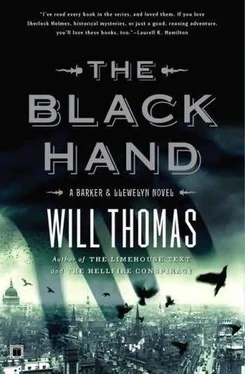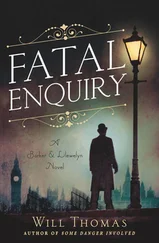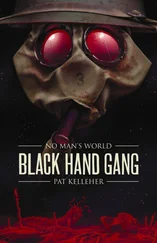Will Thomas - The Black Hand
Здесь есть возможность читать онлайн «Will Thomas - The Black Hand» весь текст электронной книги совершенно бесплатно (целиком полную версию без сокращений). В некоторых случаях можно слушать аудио, скачать через торрент в формате fb2 и присутствует краткое содержание. Жанр: Исторический детектив, на английском языке. Описание произведения, (предисловие) а так же отзывы посетителей доступны на портале библиотеки ЛибКат.
- Название:The Black Hand
- Автор:
- Жанр:
- Год:неизвестен
- ISBN:нет данных
- Рейтинг книги:3 / 5. Голосов: 1
-
Избранное:Добавить в избранное
- Отзывы:
-
Ваша оценка:
- 60
- 1
- 2
- 3
- 4
- 5
The Black Hand: краткое содержание, описание и аннотация
Предлагаем к чтению аннотацию, описание, краткое содержание или предисловие (зависит от того, что написал сам автор книги «The Black Hand»). Если вы не нашли необходимую информацию о книге — напишите в комментариях, мы постараемся отыскать её.
The Black Hand — читать онлайн бесплатно полную книгу (весь текст) целиком
Ниже представлен текст книги, разбитый по страницам. Система сохранения места последней прочитанной страницы, позволяет с удобством читать онлайн бесплатно книгу «The Black Hand», без необходимости каждый раз заново искать на чём Вы остановились. Поставьте закладку, и сможете в любой момент перейти на страницу, на которой закончили чтение.
Интервал:
Закладка:
“Golden Fleece,” I repeated. “Toisin d’or.”
“Exactly.”
“I believe I am getting a headache. So why would they help the Mafia but not Etienne?”
“They’re not. Pollock is saying they won’t choose sides.”
“Excuse me, sir, but are you prepared to face the Sicilians alone?”
“Not completely alone, I trust, but I must do something. We are obligated to the Home Office now.”
“Or is it because of Etienne?”
“No. I know that as soon as he can crawl out of his hospital bed, he shall go after his attackers and, in his weakened state, give them the opportunity to finish what they started, but, believe me, Etienne would be the very worst of clients.”
“So, are you a Freemason, sir?” I dared ask.
“No,” he replied. The word was accompanied by a plume of smoke from his mouth.
“But if you were, you would not be permitted to tell me, correct?”
“Correct.”
“So, either you are not a member, or you are a member. Which is it?”
“You tell me-you’re the detective.”
“Private enquiry agent,” I corrected.
“Not yet, rascal.” Barker finished his pipe and knocked out the ash against the bench, scattering it in the light breeze. “You’re still an apprentice.”
7
I cannot help but agree with Dickens, who said in The Mystery of Edwin Drood , “I don’t love doctors, or doctor’s stuff.” Now I have no wish to slight the medical profession, great men all, but I have a little trouble with those who will cheerily offer promises of a healthy recovery based solely upon a spirit of optimism. I wouldn’t go so far as to call Dummolard a friend-our relationship was rather as it was that morning multiplied by three hundred and sixty-five-however, I was relieved when we returned to Charing Cross Hospital to find that the Frenchman had awakened from surgery and the doctor assured us that, barring the unforeseen, he would pull through. I wanted to know the exact amount the unforeseen represented in his mind; but the doctor, all smiles, amiably brushed off my concerns. He had managed, at least, to pacify the two-headed hydra, mere et fille , and they were in the room with the patient now. We sat down again, and I felt vaguely concerned that there was now a chair I considered mine in this hospital.
“Now that we know he’s safely out of surgery,” Barker said to me, “let’s go over to Scotland Yard. I want to speak with this Palermo inspector Poole mentioned. Perhaps he can shed some light on what’s going on.”
There was a time, and recently it was, too, when walking into the Criminal Investigation Department made me go clammy all over. It felt as if all I had to do was answer one question wrong and I’d be on my way back to prison. The fear had passed now; and I saw the building as it was, slightly damp and seedy, in need of a fresh coat of paint, and full of people milling about who looked bored or upset.
Cyrus Barker stopped and looked at some offices on the first floor. This was where he had taught his physical culture classes before a bomb left by the Irish Republican Brotherhood had rent it asunder. He sniffed dismissively and walked on.
When we found Poole’s office, he had a small crate open on his desk and was looking through it.
“What have you got, Terry?”
“More work,” Poole grumbled. “Commissioner Henderson has chosen me to try out the new Bertillon system of detection from Paris.”
“Does it work?” my employer asked.
“I have no idea as yet. It’s scientific enough, I’ll grant you that. I can see the importance of photographing criminals as they are booked in and taking down their vitals, I suppose, but Inspector Pettigrilli’s taking it much too far. Why measure a man’s forearms or the circumference of his head, I ask you? What’s that going to accomplish? It’s a waste of our valuable time. It takes a good half hour to fill out each card, and someone walking in the door every five minutes. It will turn us all into clerks.”
“What card?” I asked. “What exactly is the Bertillon system?”
“It’s a scientific method created to identify criminals,” Barker explained. “It was invented by Alphonse Bertillon, chief of criminal identification for the Paris police. It involves a careful measurement and indexing of dozens of parts of the body, parts that cannot change over time and that no criminal can disguise, such as the shape of his ears or the length of his feet. It’s more complicated than that, of course; and, as I recall, it’s tied up with the so-called science of eugenics. If one has the wrong ear shape, for example, it proves somehow one is racially inferior.”
“I haven’t read that far,” Poole admitted. “I just got the instructions today. Look at all these instruments!”
He lifted a pair of calipers and mockingly measured the diameter of his own head. Then he brought out a set of rulers, measuring tapes, special tools for measuring parts of the body, and finally a small wooden bench with centimeters marked upon it.
“So this Sicilian inspector Pettigrilli is in the country to teach the latest police methods,” Barker stated.
“Yes. It’s a cooperative effort between the French, English, and Italian governments.”
“Europe’s once again bringing enlightenment to benighted England,” I put in.
“Something like that-though if you ask me, it’s more a way to put money in Monsieur Bertillon’s pocket.”
“What’s your impression of Pettigrilli?” Barker asked.
“He’s all right, for an Italian. He’s the first one trained by the Surete.”
“I thought the Sicilians hate the French,” I said.
“Pettigrilli says it is important to make alliances; and if the French are willing to extend an olive branch and allow him to study the latest methods, he would be a fool not to do so. Claims it will r-revolutionize the world.”
“I’d like to meet him,” Barker said.
“He’s giving a lecture now for the benefit of the Special Branch, not that they’ll appreciate it.” Poole pulled out his watch and consulted it. “He should be done soon.”
“How much practical use do you think the Bertillon system will be?”
Poole ran his fingers through his long, drooping whiskers. “It would require retraining every officer in the country and getting them to agree on the same procedures. Then thousands of these kits must be sent out everywhere and a working camera given to every constabulary, with training in photography and developing. Records would have to be filled out after each arrest and an officer hired and trained to do naught else but keep them. You’re talking about thousands of pounds there. Plus, it’s all theory. Only a few arrests have occurred in France because of the new records, and those were due more to the photographs than the measurements, I’m thinking. It’s all good intentioned, but I’d have to be convinced of its reliability.”
“You’re skeptical,” Barker concluded.
“I am, but then, the commissioner doesn’t lose any sleep at night wondering whether the Yard is being run to my satisfaction. It’s more ‘go and make it work, or feel my boot hard against your backside.’ ”
There was a clamor of stout shoes in the hall and men began filing past Poole’s door.
“The meeting must have adjourned,” Poole said. He came quickly around the desk and stepped out into the corridor. “Mr. Pettigrilli!” he called out. “Could I speak with you for a moment?”
A squarely built man stepped into the room, dressed in a European-looking suit and an alpine-style hat. He had good features-dark eyes and a thin mustache that made him look refined. He seemed vigorous, a dynamo running on some internal source of energy.
Читать дальшеИнтервал:
Закладка:
Похожие книги на «The Black Hand»
Представляем Вашему вниманию похожие книги на «The Black Hand» списком для выбора. Мы отобрали схожую по названию и смыслу литературу в надежде предоставить читателям больше вариантов отыскать новые, интересные, ещё непрочитанные произведения.
Обсуждение, отзывы о книге «The Black Hand» и просто собственные мнения читателей. Оставьте ваши комментарии, напишите, что Вы думаете о произведении, его смысле или главных героях. Укажите что конкретно понравилось, а что нет, и почему Вы так считаете.












